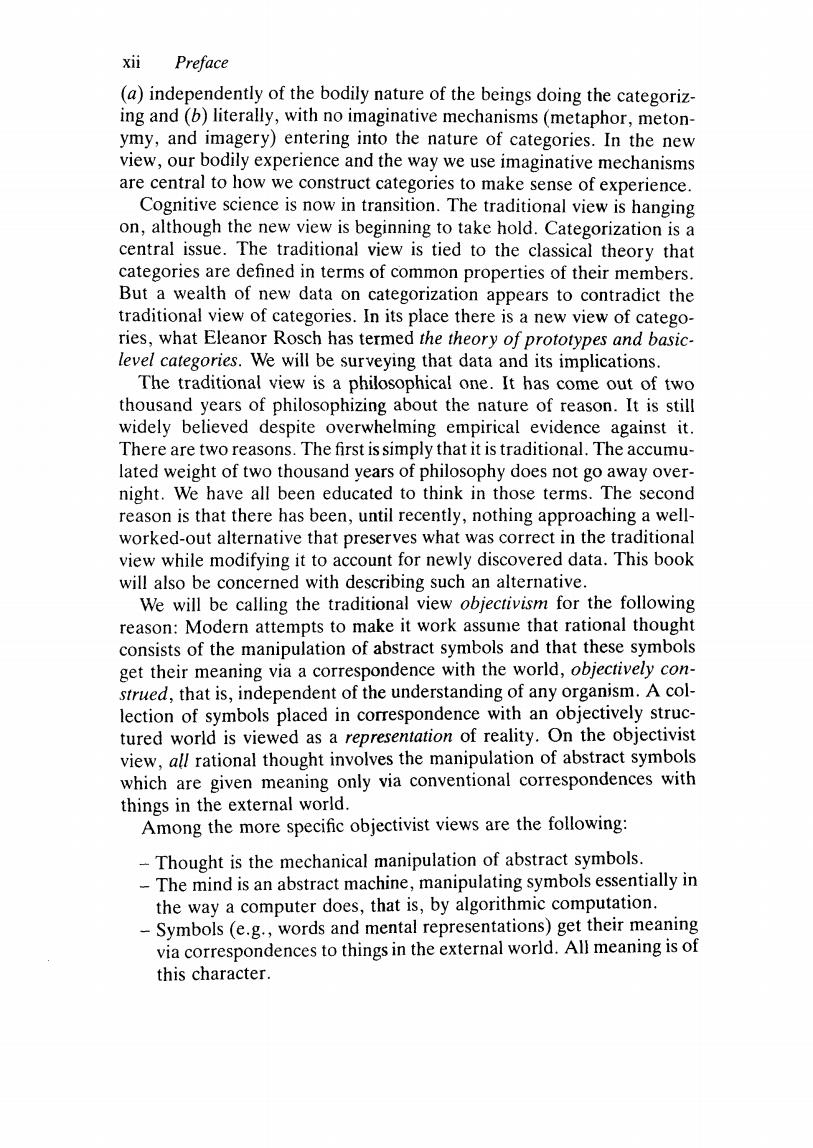正在加载图片...

xii Preface (a)independently of the bodily nature of the beings doing the categoriz- ing and(b)literally,with no imaginative mechanisms(metaphor,meton- ymy,and imagery)entering into the nature of categories.In the new view,our bodily experience and the way we use imaginative mechanisms are central to how we construct categories to make sense of experience. Cognitive science is now in transition.The traditional view is hanging on,although the new view is beginning to take hold.Categorization is a central issue.The traditional view is tied to the classical theory that categories are defined in terms of common properties of their members. But a wealth of new data on categorization appears to contradict the traditional view of categories.In its place there is a new view of catego- ries,what Eleanor Rosch has termed the theory of prototypes and basic- level categories.We will be surveying that data and its implications. The traditional view is a philosophical one.It has come out of two thousand years of philosophizing about the nature of reason.It is still widely believed despite overwhelming empirical evidence against it. There are two reasons.The first is simply that it is traditional.The accumu- lated weight of two thousand years of philosophy does not go away over- night.We have all been educated to think in those terms.The second reason is that there has been,until recently,nothing approaching a well- worked-out alternative that preserves what was correct in the traditional view while modifying it to account for newly discovered data.This book will also be concerned with describing such an alternative. We will be calling the traditional view objectivism for the following reason:Modern attempts to make it work assume that rational thought consists of the manipulation of abstract symbols and that these symbols get their meaning via a correspondence with the world,objectively con- strued,that is,independent of the understanding of any organism.A col- lection of symbols placed in correspondence with an objectively struc- tured world is viewed as a representation of reality.On the objectivist view,all rational thought involves the manipulation of abstract symbols which are given meaning only via conventional correspondences with things in the external world. Among the more specific objectivist views are the following: -Thought is the mechanical manipulation of abstract symbols. -The mind is an abstract machine,manipulating symbols essentially in the way a computer does,that is,by algorithmic computation. -Symbols (e.g.,words and mental representations)get their meaning via correspondences to things in the external world.All meaning is of this character.xii Preface (a) independently of the bodily nature of the beings doing the categorizing and (b) literally, with no imaginative mechanisms (metaphor, metonymy, and imagery) entering into the nature of categories. In the new view, our bodily experience and the way we use imaginative mechanisms are central to how we construct categories to make sense of experience. Cognitive science is now in transition. The traditional view is hanging on, although the new view is beginning to take hold. Categorization is a central issue. The traditional view is tied to the classical theory that categories are defined in terms of common properties of their members. But a wealth of new data on categorization appears to contradict the traditional view of categories. In its place there is a new view of categories, what Eleanor Rosch has termed the theory of prototypes and basiclevel categories. We will be surveying that data and its implications. The traditional view is a philosophical one. It has come out of two thousand years of philosophizing about the nature of reason. It is still widely believed despite overwhelming empirical evidence against it. There are two reasons. The first is simply that it is traditional. The accumulated weight of two thousand years of philosophy does not go away overnight. We have all been educated to think in those terms. The second reason is that there has been, until recently, nothing approaching a wellworked-out alternative that preserves what was correct in the traditional view while modifying it to account for newly discovered data. This book will also be concerned with describing such an alternative. We will be calling the traditional view objectivism for the following reason: Modern attempts to make it work assume that rational thought consists of the manipulation of abstract symbols and that these symbols get their meaning via a correspondence with the world, objectively construed, that is, independent of the understanding of any organism. A collection of symbols placed in correspondence with an objectively structured world is viewed as a representation of reality. On the objectivist view, all rational thought involves the manipulation of abstract symbols which are given meaning only via conventional correspondences with things in the external world. Among the more specific objectivist views are the following: - Thought is the mechanical manipulation of abstract symbols. - The mind is an abstract machine, manipulating symbols essentially in the way a computer does, that is, by algorithmic computation. _ Symbols (e.g., words and mental representations) get their meaning via correspondences to things in the external world. All meaning is of this character